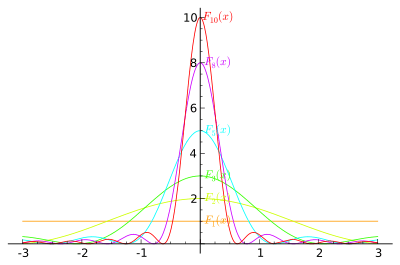Fejér kernel
In mathematics, the Fejér kernel is a summability kernel used to express the effect of Cesàro summation on Fourier series. It is a non-negative kernel, giving rise to an approximate identity. It is named after the Hungarian mathematician Lipót Fejér (1880–1959).

Definition
The Fejér kernel is defined as
where
is the kth order Dirichlet kernel. It can also be written in a closed form as
 ,
,
where this expression is defined.[1]
The Fejér kernel can also be expressed as
 .
.
Properties
The Fejér kernel is a positive summability kernel. An important property of the Fejér kernel is  with average value of
with average value of  .
.
Convolution
The convolution Fn is positive: for  of period
of period  it satisfies
it satisfies
Since  , we have
, we have  , which is Cesàro summation of Fourier series.
, which is Cesàro summation of Fourier series.
![\|F_n*f \|_{L^p([-\pi, \pi])} \le \|f\|_{L^p([-\pi, \pi])}](../I/m/268cc26b0bd7fee89c72a8c8e4d7dbb6.png) for every
for every 
for  .
.
Additionally, if ![f\in L^1([-\pi,\pi])](../I/m/c5fe1875ff12830d83b938d537d1f44f.png) , then
, then
Since ![[-\pi,\pi]](../I/m/911bebeafbf3d4845e122edfc4f667f8.png) is finite,
is finite, ![L^1([-\pi,\pi])\supset L^2([-\pi,\pi])\supset\cdots\supset L^\infty([-\pi,\pi])](../I/m/766b57744c45a0916feb34f317368e7f.png) , so the result holds for other
, so the result holds for other  spaces,
spaces,  as well.
as well.
If  is continuous, then the convergence is uniform, yielding a proof of the Weierstrass theorem.
is continuous, then the convergence is uniform, yielding a proof of the Weierstrass theorem.
- One consequence of the pointwise a.e. convergence is the uniquess of Fourier coefficients: If
 with
with  , then
, then  a.e. This follows from writing
a.e. This follows from writing  , which depends only on the Fourier coefficients.
, which depends only on the Fourier coefficients. - A second consequence is that if
 exists a.e., then
exists a.e., then  a.e., since Cesàro means
a.e., since Cesàro means  converge to the original sequence limit if it exists.
converge to the original sequence limit if it exists.



